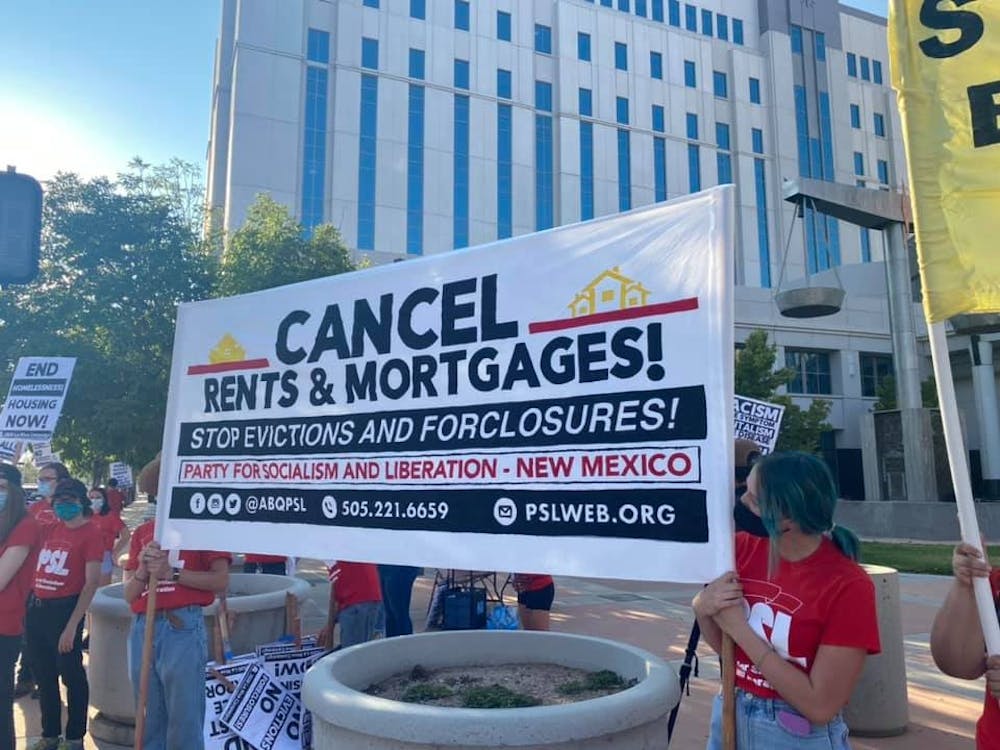DOWNTOWN — As the coronavirus pandemic continues to rage across the nation, the United States is staring down the barrel of another crisis: a wave of evictions and foreclosures.
Almost half of New Mexicans have experienced a loss of employment income since the pandemic began, according to Census Bureau data, and a recent estimate suggested that up to 42% of New Mexican renters are at risk of eviction.
In response, the Party for Socialism and Liberation (PSL) and the La Riva/Freeman 2020 presidential campaign organized a protest calling for the cancellation of rent and mortgages on Saturday, Aug. 29 in downtown Albuquerque.
“The protest was strong,” said Karina Rodgers, an organizer for the PSL and a protest attendee. “We had about 50 community members show up and participate.”
Rodgers said many attendees made “frustrated and impassioned” speeches about struggling to pay rent because of the pandemic and that the protest drew support from people driving by in their cars.
“Almost every other car was honking in support,” Rodgers said. “People were raising their fists in solidarity as they drove by.”
The federal protections provided by the CARES Act were set to expire on Aug. 31 but were extended through the end of the year. The eviction and foreclosure protections, however, only apply to renters living in homes with some form of federally-backed mortgages.
New Mexico’s stay on evictions is still in place, but landlords can still file for eviction. This means that evictions can still be approved, but the action will not be taken until the New Mexico Supreme Court rescinds the stay.
Renters cannot be physically removed from their homes while the eviction stay is in place, but many are missing rent payments that may be difficult to pay back.
“There may be a stop on evictions right now,” said Bex Hampton, another organizer for the PSL and a University of New Mexico alumni. “(But) people are still going deeper and deeper into debt, more and more people are losing their jobs and unemployment has recently been cut. There needs to be more done, locally and nationally.”
Studies show that there are serious health outcomes connected to the stress caused by eviction threats and proceedings. If a large number of New Mexicans are evicted, the state will be facing a second public health crisis beyond the pandemic.
“The effects of eviction are just so wide-ranging,” said Serge Martinez, a professor at the UNM School of Law with a background representing tenants and tenant associations. “It’s traumatic to be evicted. Local social supports (are) severed. The effect is one that ripples out and has long-term effects.”
Get content from The Daily Lobo delivered to your inbox
These extend beyond stress and negative health outcomes. Eviction harms tenants’ credit scores, which can make finding a new home difficult. In some cases, being evicted can mean a person becomes unhoused.
“It’s hard to find decent (housing) if you have an eviction,” said Hampton, who has worked in public housing. “Just one eviction can keep someone in a cycle of homelessness.”
The effects of an eviction wave would be likely to hit hardest in groups who are still recovering from the 2008 economic recession.
That crisis — now over a decade removed from its devastating peak — is still being felt, particularly in marginalized groups. Once again, these groups are disproportionately at risk to lose their housing in the midst of a pandemic that has disproportionately affected them already.
“The communities that have rebounded the least (from 2008) have been communities of color,” Martinez said. “The foreclosure crisis hit Black homeowners disproportionately, so now more of those folks are renters than would be otherwise. It just builds.”
The Great Recession of 2008 led to around 10 million foreclosures. For comparison, if policymakers sit on their collective hands, the coronavirus recession could unhouse twice as many renters, according to research from the international nonprofit Aspen Institute.
“We see the government bailing out Wall Street, bailing out the banks and bailing out (large) companies,” Hampton said. “But they leave working-class people and even people who own small businesses who are unable to pay rent out to dry.”
As various safeguarding measures fall away, the nation pushes closer to crisis.
“The dam is not just breaking,” Martinez said. “We are actively removing stones from it.”
Martinez advised that tenants should do all they can to attend hearings if they are served with an eviction notice. Many courts are conducting remote trials in eviction cases, and if tenants fail to appear, the judge will automatically rule in favor of the landlord.
“There’s a stay, but if you get an eviction notice, you should still go to court,” Martinez said. “Because if you don’t, you’re definitely going to get evicted. Even if you think you don’t have a good case, you still have to show up.”
If a tenant can demonstrate financial hardship, the stay will still apply to them. If they can’t, the judge will likely rule in favor of the landlord.
Martinez further emphasized that the state could prevent the wave of evictions from occurring once the stay is lifted and suggested a re-appraisal of the country’s housing system.
“No rent, no evictions, no mortgage payments: That’s only part of a long-term solution,” he said. “We should stop the machinery that moves to make people homeless, but we have to then take advantage of that break in the action to think about how the system works.”
William Bowen is a freelance reporter at the Daily Lobo. He can be contacted at news@dailylobo.com or on Twitter @BowenWrites






